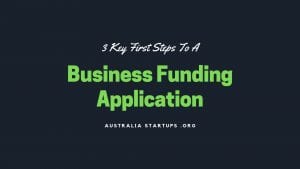How to apply for government funding the right way
In the early stages of a small business startup it’s critical to obtain the funding necessary to take your small business through the key startup stages and eventuality through to the launch. This article will explain the process of government funding and what the right way is to apply for government funding.
While there are nearly a thousand government funding programs, your small business if eligible for any funding may only be successful at obtaining funding from a handful of those programs. Don’t let this discourage you from applying to government funding, but let it be a lesson that you as a small business owner, when applying for funding have to be extra careful to ensure that you meet all of the criterias, complete all of the requirements and properly fill out a funding application. Otherwise you may simply be slapped with a big ol “denied” stamp.
Before we get into the right way of applying for government funding programs for your small business, note that there are a number of factors that can determine if your small business may be eligible or not to receive any funding. These factors include, but are not limited to:
- Your Location
- Your Industry
- Your Funding Needs (hiring, training, purchase of tools, R&D, advertising…etc)
- Funding Amounts
- Your Business Plan
- Your Credit Score
- Time of Year
- Funding Program Deadline
- and more…
It is important to know that not all small business owners are eligible for funding from the government, but in order to get started and get an idea of what it possible and how your small business may take advantage, we suggest you try our the Small Business Startup Assessment Tool on our website. After answering a few questions, you will be displayed a number of programs available an potential funding amounts. Again, this is just a basic idea of what may be available, but once you start digging deeper and looking at the specific criteria of each funding program, you may find different results.
When you apply for government funding, is imperative that you know funding doesn’t happen over night. In fact the average small business owner (on their own) spends between 4 to 5 weeks researching available funding programs before they actually find the few programs which they can apply for. With professional help, and those who use our Funding Database, we’ve seen that 4 to 5 week period decrease to a few days – simply because we have all of the funding programs organized in one place for you to search through.
Once you find the funding programs that may be right for you, applying to these funding programs may take you between a few days to a few weeks – depending on the funding agency requirements and what you have prepared as of the time you start. Most programs require you to have a business plan in order to apply, and if you don’t have one, a business plan may take a few weeks to create.
After successfully applying and sending your funding application off for review, the funding agencies may take between 30 days to well over a year to reply with a response. We here at australiaStartups have seen small business owners receive a response in as little as 2 weeks while some have been 6 months to a year later.
The lesson here is that applying for government funding from start to finish may take anywhere between a month to 6 months, so be sure to get started sooner.
So how do you apply for government funding the right way?
Step 1: Prepare your business plan
In order to be successful at applying for government funding, your first order of business should be to prepare a business plan for your small business. A properly developed business plan will prepare you for anything in small business, especially the financial side. If you’re looking to apply for funding for your small business it’s important to know how much funding you need, when you need the funding, what you need it for – as well to prepare yourself for the worst case if you’re not able to obtain the funding.
Your business plan’s financial projections should be able to tell you exactly what you need funding for (at what stage), for what and how much.
To create a business plan, you can outsource and hire a professional writer who can do it for you. However the cost of something like this, depending on your industry can be between $2,500 to $5,000, which is a big expense when starting up. Alternatively you can write it yourself, or use tools such as our Business Plan Builder Tool to create your own professional business plan. At which point you can also use our business plan experts to review your plan at no charge once you’re a member.
Step 2: Research the programs
Once you’ve developed your business plan, you should have a better idea of how much money you need and what you need it for. This makes it much easier for you to search for government funding programs and to apply for funding. Most small business owners in the startup stage require funding for the following:
- Starting up costs
- Hiring of employees
- Training staff
- To purchase tools and equipment
- To pay for research and development
- To pay for marketing and advertising
- To improve cash flow
Tip #1: Don’t just apply to any funding program because it’s available. Apply only to those that meet the 3 top criteria (location, industry, funding needs), plus ensure you meet the requirements.
Tip #2: If a funding program has a maximum funding amount, don’t ask for that much. Try to break down how much you need into smaller amounts. Once you’re accepted and funded by a program once, it’s a lot easier to go back in and try again.
Tip #3: Not all programs fund all purposes. Be sure to break down your needs and review the program criteria.
The reason why the government has so many different funding programs is because there are so many different funding agencies across australia. Not all funding agencies are connected to one another, and not all of them fund the exact same thing. In fact, there are may funding programs that strictly fund businesses that are in the Agriculture industry, which means that only those in the Agriculture industry can get the funding from these programs. If you are an mechanic garage, or a cleaning business – you would be wasting your time applying to these funding programs.
When applying the right way, researching the available funding programs is key to success. Be sure to break down your needs and ask only for what it is that you need. As exciting as it is to obtain a lot of money from the government, it’s more likely that you will be denied for asking for too much (and not because you can’t get it, but because the programs available rather fund more businesses then less).
Step 3: Review, apply and re-apply
Once you’ve found the few programs that you seem to be eligible for by meeting the criteria and eligibility requirements, it’s important to complete the government funding applications the right way. You’d be surprised to know how many small business owners for apply for government funding are denied funding simply because they didn’t follow the funding application rules.
Think about when you are doing your passport renewal – every single person reads and re-reads the application form 5 times in order to ensure that the passport office doesn’t send it back a few weeks later and tells you that something isn’t legible or that you didn’t provide a signature..etc The funding applications offered through the government are the exact same way, complicated.
When applying for funding programs be sure to read, and re-read the application. If possible, get somebody else to double check it as well.
Remember that when you send in your application in (and you need money), if you made a mistake and your application will be denied, you may not receive it back for a few weeks or months. By this time, it may be too late for your small business. So be sure to review your application, and even consider registering for our membership and taking advantage of our funding application review service.
If you are denied funding simply because you didn’t meet the requirements, or didn’t provide all that was needed, review your application and re-apply. Sometimes it’s possible you didn’t get funding because you application past the deadlines, or the funding ran out, or many other reasons. So it’s important not to give up and re-apply when you feel confident again
Similar Topics:apply for funding, apply for government funding, Government Funding





